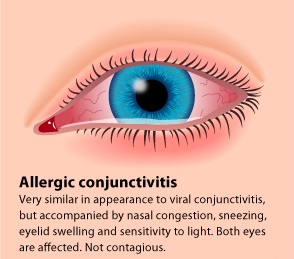 If you suffer from allergies that affect your eyes, which is also known as allergic conjunctivitis, you are not alone! Approximately one in five people suffer from perennial and / or seasonal eye allergies. Perennial allergies are caused by the things that are a constant in your life. For example, your pets, dust mites, perfume and smoke. If your eye allergies seem to be worse at certain times of the year then chances are you also suffer from seasonal allergies. Examples of seasonal allergens are mold spores, pollen from weeds, grasses, trees and other plants.
If you suffer from allergies that affect your eyes, which is also known as allergic conjunctivitis, you are not alone! Approximately one in five people suffer from perennial and / or seasonal eye allergies. Perennial allergies are caused by the things that are a constant in your life. For example, your pets, dust mites, perfume and smoke. If your eye allergies seem to be worse at certain times of the year then chances are you also suffer from seasonal allergies. Examples of seasonal allergens are mold spores, pollen from weeds, grasses, trees and other plants.
Eye allergies are caused by the body’s immune system mistaking a normally harmless substance for one that is a threat. When such a substance comes in contact with the conjunctiva, which is the mucous membrane that lines the surface of the eye as well as under the eyelids, the body produces antibodies that cause the eyes to release histamine and other substances to fight it. This is what causes eyes to be red, itchy, puffy and watery. These symptoms, while annoying and inconvenient, are usually not permanently damaging to your eyesight. However, these same symptoms can also be caused by infections and other conditions that can be very harmful to your eyesight, so you should always see your doctor to be sure that you are properly diagnosed and treated.
Your ophthalmologist can perform an exam to be sure that you don’t have an infection, and then recommend some treatments that could help alleviate your allergy symptoms. One thing you can try at home is flushing your eye with lukewarm tap water or a commercial eyewash solution. Moistening the eyes with artificial tears can also sometimes help with allergy symptoms. Your doctor may prescribe antihistamine eyedrops for you to use. These work by blocking the histamine receptors in the conjunctiva and this helps alleviate itchiness. Nonsteroidal anti-inflammatory eyedrops are another option for treatment. In severe cases a steroid anti-inflammatory eyedrop can be used. These must be used with care because there are potential side effects from steroids that need to be taken into consideration if they must be used long term.
If you have any questions about eye allergies give the office of Eye Physicians of North Houston a call at
(281) 893-1760 or visit our website by clicking here.
If you would like to read the original article that inspired this blog post, click here.
